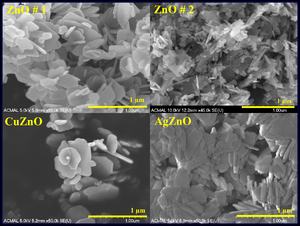Inhibition of growth of S. epidermidis by hydrothermally synthesized ZnO nanoplates

The antibacterial effect of zinc oxide (ZnO#1) as prepared and annealed (ZnO#2) at 400 °C, Cu doped ZnO (CuZnO), and Ag doped ZnO (AgZnO) nanoplates on Staphylococcus epidermidis was investigated for the inhibition and inactivation of cell growth. The results shows that pure ZnO and doped ZnO samples exhibited antibacterial activity against Staphylococcus epidermidis (S. epidermidis) as compared to tryptic soy broth (TSB). Also it is observed that S. epidermidis was extremely sensitive to treatment with ZnO nanoplates and it is clear that the effect is not purely depend on Cu/Ag. Phase identification of a crystalline material and unit cell dimensions were studied by x-ray powder diffraction (XRD). The scanning electron microscopy (SEM) provides information on sample's surface topography and the EDX confirms the presence of Zn, O, Cu and Ag. X-ray photo-electron spectroscopy (XPS) was used to analyze the elemental composition and electronic state of the elements that exist within the samples. These studies confirms the formation of nanoplates and the presence of Zn, O, Ag, Cu with the oxidation states +2, −2, 0 and +2 respectively. These results indicates promising antibacterial applications of these ZnO-based nanoparticles synthesized with low-cost hydrothermal methods.
Keywords[edit | edit source]
zinc oxide;Staphylococcus epidermidis;bactericide; nanoplate; nanotechnology
See also[edit | edit source]
- Environmental remediation of real textile dyeing wastewater under visible light and inactivation of pathogenic bacteria using ZnO/CuO nano-needles
- Antibacterial and anticancer activity of hydrothermally-synthesized zinc oxide nanomaterials using natural extracts of neem, pepper and turmeric as solvent media
- Structural and optical characterization and efficacy of hydrothermal synthesized Cu and Ag doped zinc oxide nanoplate bactericides
- Peanut shaped ZnO microstructures: controlled synthesis and nucleation growth toward low-cost dye sensitized solar cells





